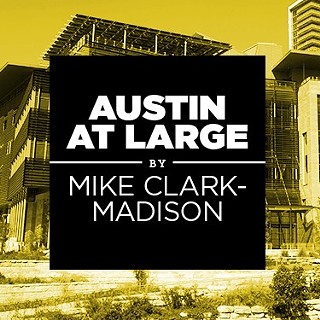Austin at Large: The Costly Pastime of Politics
The big bucks are rolling in to local candidates and PACs. Why, and for what?
By Mike Clark-Madison, Fri., Oct. 9, 2020
Voices of Austin, the political nonprofit that advocates for undoing much of what the current City Council has done, does not take money from the Koch brothers. We never thought or said they did, because why would they, and why would the right-wing Koch network – which is already well-represented in Austin and Texas politics – need a new place to park its cash? We take VoA at its word that it is only funded by Real Austinites.
That's all we can do, because VoA is not organized as a political action committee that must disclose its donors. For most of its causes – re-funding the police, not revising the Land Development Code, etc. – that's legally fine; VoA has the same right to express its opinions as I do. But for its biggest cause of the moment, opposing Project Connect and Proposition A, it certainly seems to me that VoA is expressly advocating defeat of the measure, not just raising questions and educating, and is spending money on advertising to that effect. So it really should form a PAC to do that. There are PACs formed both for and against Project Connect, and they, along with all the Council candidates and the backers of the Prop B active-transportation bond, had to file their 30-days-out campaign finance reports this week. Unsurprisingly, the transit measure is where the big money is being raised and spent, both for and against. The pro-Prop A PAC Mobility for All raised nearly $1 million; the antis at Our Mobility Our Future raked in more than $275,000. Both have already spent a lot of money, but still have most of their haul available for the stretch run. Your mailboxes and screens will doubtlessly reflect this in the days ahead.
The Clear Voice of Cash
The 30-days-out reports provide the most informative snapshot of where the candidates and causes stand in any given local election cycle. Public polling is scarce and usually not very illuminating, since voters' views are much less formed than in the partisan races up-ballot. Endorsements matter as a signal, but not to sway outcomes all by themselves. But money talks with a very clear voice, telling everyone who's serious and who's not, laying out the contours of support, and paying for the messaging that drives discourse on each race.
The next required filing is eight-days-out, which becomes less relevant with every cycle as more votes get cast earlier. This year, with pandemic-driven mail balloting and an extra week of early voting, many of these contests will have been decided before efforts to get out the Election Day vote even begin. So that raises the question: How much campaign cash is too much? Is it possible for the PACs and candidates to spend their money in meaningful ways?
For the candidates, this problem is somewhat self-limiting, since individual contributions are limited to $400 per person. While PACs can make independent expenditures on behalf of a candidate, none has reported doing so yet (except for modest in-kind assistance from the Workers Defense Action PAC to D2's David Chincanchan, and $400 for Jimmy Flannigan from the homebuilders). Some may still do so before the eight-day-out deadline; the public safety unions, particularly the firefighters, are worth watching. But PACs were more involved in more races at this point in 2018 than they are now.
Even with the $400 limit, you can still raise a truckload of money for a Council race. Incumbents Flannigan and Leslie Pool have more than $50,000 on hand, Greg Casar has $67,000, and Alison Alter has an eye-popping $150,000. None have large loans to themselves outstanding. The only challengers with that kind of money are up against Alter in D10: Pooja Sethi, Robert Thomas, and Jennifer Virden all have at least $65,000 on hand, in Virden's case including a $50,000 self-loan. Virden and Thomas both have support from conservatives, but in other races the right-leaning candidates (Louis Herrin in D4 and Mackenzie Kelly in D6) have less than half as much money to play with. And in D2, Chincanchan and Vanessa Fuentes are both in the $30,000 range.
The Right to Grumble
The relative surfeit of cash in D10, the wealthiest district with the highest voter turnout, is not shocking, but it would take some creativity for Alter to spend $150K in the next three weeks. In D4, the poorest district with the lowest turnout, Casar has enough money to last for multiple election cycles. But with lots of small-dollar contributors, there's less interesting backstory as to why people contribute to one candidate (or more) over others.
That's totally not the case for the PACs, where people can give as much as they please. Naturally, many of the high rollers throwing in to support Prop A are people who stand to gain from its passage – real estate firms like Endeavor, engineering firms like HNTB, and both Austin FC and Brandywine (developers of Broadmoor), each of which gets a new Red Line station under the plan. Is this corrupt, as Voices of Austin charges? Or is it no big surprise that a $7 billion investment package has a lot of friends with money who want it to succeed?
You probably have an opinion on this already. I find it more intriguing that people who don't want it to succeed, yet have no real stake in the outcome beyond their right to grumble, are willing to throw down equally big chunks of change. What does the fact that a bunch of retirees, "self-employed investors," and opaque real estate LLCs have contributed five-figure sums to the anti-Prop A campaign say about our democratic process and our discourse? I'm not sure it's all that flattering.
Got something to say? The Chronicle welcomes opinion pieces on any topic from the community. Submit yours now at austinchronicle.com/opinion.









